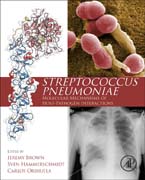
Streptococcus Pneumoniae: Molecular Mechanisms of Host-Pathogen Interactions
Brown, Jeremy
Hammerschmidt, Sven
Orihuela Fernández, Juan Carlos
Streptococcus Pneumoniae: Molecular Mechanisms of Host-Pathogen Interactions provides a comprehensive overview of our existing knowledge on Streptococcus pneumoniae antibiotic resistance, dissemination, and pathogenesis, including immunology. It presents a state-of-the-art overview of the implications of existing data, along with the areas of research that are important for future insights into the molecular mechanisms of pneumococcal infections and how to combat these infections. Users will find a timely update on the topic, as the dramatic increase in antibiotic resistance pneumoniae cases and limitations of the currently available pneumoniae vaccines are creating new concerns on these gram-positive bacteria that are endowed with a high virulence potential, and are the most common etiologic agent of respiratory and life-threatening invasive diseases. Provides an updated overview of our existing knowledge on Streptococcus pneumoniae antibiotic resistance, dissemination, and pathogenesis, including immunology Helps strengthen interdisciplinary networking and the focus of scientific resources by targeting epidemiology, vaccines, genetics, antibiotic resistance, clonal dissemination, Streptococcus pneumoniae biology, functional genomics, inflammasome, biomarkers, and moreMulti-authored by leaders in the field who present a state-of-the-art overview of what the implications are of existing data, and the areas of research that are important for future insights into the molecular mechanisms of pneumococcal infections Supports combinatory networking in order to find new solutions in clinical therapiesReflects the most topical pneumococcal research trends INDICE: Section A: Streptococcus pneumoniae Epidemiology and Vaccines 1. Pneumococcal molecular epidemiology 2. Antibiotic resistance of pneuomocci 3. Pneumococcal vaccination and consequences 4. Protein based vaccines Section B: Genetics and Functional Genomics of Streptococcus pneumoniae 5. Genomics, genetic variation and regions of differences 6. Functional Genomics of pneumococci (Transcriptional regulation) 7. Pneumococcal genetic recombination during colonization and biofilm formation 8. The pneumococcal cell wall 9. Capsule structure, synthesis and regulation 10. Pneumococcal ABC transporters and their role in physiology and multidrug resistance Section C: Streptococcus pneumoniae Biology 11. Structure and functions of surface protein/choline binding proteins 12. Pneumococcal non-adhesive surface proteins 13. Biofilm formation under in vitro conditions 14. Pneumolysin Section D: Pneumococcal Interactions with the Host 15. Nasopharyngeal colonization 16. Otitis media and biofilms 17. Pneumococcal pili and adhesins 18. Exploitation of host signal transduction pathways induced by S. pneuomoniae 19. Mechanisms of predisposition to pneumonia: infants, the elderly, and viral infections 20. Mechanisms causing the inflammatory response to Streptococcus pneumoniae 21. Immune evasion mechanisms of pneumococci 22. Cell mediated adaptive immunity to pneumococci 23. Pneumococcal invasion
- ISBN: 978-0-12-410530-0
- Editorial: Academic Press
- Encuadernacion: Cartoné
- Páginas: 482
- Fecha Publicación: 14/05/2015
- Nº Volúmenes: 1
- Idioma: Inglés
